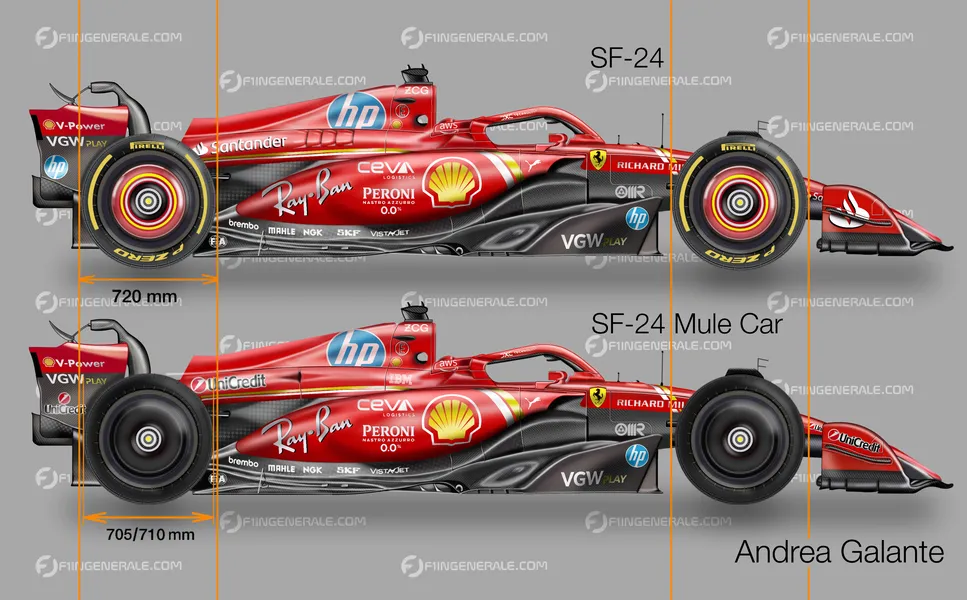
Barcelona already has a style of 2026, with Ferrari and McLaren engaged in a Pirelli check session. The purpose was to judge the newest prototype tires for the 2026 season, that are lighter and smaller in measurement.
Ferrari took to the monitor with the SF-24, giving Lewis Hamilton the chance to familiarize himself with Maranello’s newest single-seater. The adoption of smaller tires required a number of modifications to the automotive, from the suspension—adjusted to accommodate the brand new tires—to aerodynamic adjustments. FIA rules permit groups to make modifications to their automobiles to simulate the estimated aerodynamic load ranges for 2026.
The checks will assist Pirelli perceive how the mule automobiles behave, as groups don’t but bodily have their 2026 automobiles. Nevertheless, Pirelli is not going to rely completely on the information collected, as next-generation single-seaters will endure radical technical adjustments that can have an effect on their efficiency.
2026 New Tires
Photographs from the check clearly spotlight the variations in comparison with the present tires. The dimensions discount stems from the necessity to lighten the carcass and cut back aerodynamic drag.
Whereas sustaining the 18-inch rims, each entrance and rear tires could have altered dimensions. The general diameter will shrink from the present 720 mm to a variety between 705 and 710 mm. The width may even lower: the entrance tire will probably be 25 mm narrower, whereas the rear will lose 30 mm.

Comparability between SF-24 and SF-24 Mule Automobile – Supply: f1ingenerale
Simulating the masses that the 2026 tires must face up to utilizing modified current-generation automobiles will probably be a problem for Pirelli. For that reason, groups have launched particular aerodynamic options to approximate the anticipated downforce ranges.
Aerodynamics
From the images seen in current days, the low-downforce configuration instantly stands out—an uncommon setup for a technical circuit like Barcelona, which is understood for requiring excessive downforce ranges.
The entrance wing resembles the configuration seen in Las Vegas, one of many least demanding tracks when it comes to aerodynamic load, albeit with some modifications. On the rear, Ferrari adopted a low-downforce setup much like the one utilized in Monza. The purpose was to cut back aerodynamic load by about 20% to simulate the downforce ranges anticipated for 2026.

Supply:1ingenerale
It additionally seems that DRS was extensively used, even in areas of the monitor not usually designated for it throughout a race weekend, to compensate for the entrance and rear load.
Efficiency and 2026 Projections
Lap instances had been considerably slower, suggesting a efficiency drop for 2026 automobiles. Nevertheless, these information must be interpreted cautiously, as Pirelli’s sole goal was to collect helpful info for tire improvement. Drawing conclusions about future efficiency primarily based on the Barcelona information can be untimely, on condition that the checks had been carried out with automobiles conceptually totally different from these that can hit the monitor in a yr.
Nikolas Tombazis, FIA’s single-seater director, had predicted that regardless of the aerodynamic load discount, 2026 automobiles would nonetheless obtain lap instances much like present ones. This final result is the results of a number of revisions to the unique 2026 rules, launched to forestall a efficiency drop of as much as two seconds per lap.
Nikolas Tombazis defined: “We’ve elevated the automotive’s aerodynamic efficiency by about 50 factors of downforce, lowering the lack of load—which was initially estimated at round -40%—to roughly -15%. When it comes to efficiency, lap instances for the brand new automobiles will probably be very near present ones. This was executed as promised in June.”
What we witnessed was solely a simulation, nonetheless removed from the truth that awaits us. Solely when the brand new single-seaters take to the monitor will we be capable to draw concrete conclusions.
Supply: f1ingenerale



